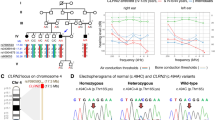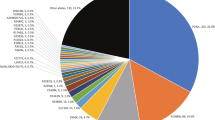Abstract
Mutations of PCDH15, encoding protocadherin 15, can cause either combined hearing and vision impairment (type 1 Usher syndrome; USH1F) or nonsyndromic deafness (DFNB23). Human PCDH15 is reported to be composed of 35 exons and encodes a variety of isoforms with 3–11 ectodomains (ECs), a transmembrane domain and a carboxy-terminal cytoplasmic domain (CD). Building on these observations, we describe an updated gene structure that has four additional exons of PCDH15 and isoforms that can be subdivided into four classes. Human PCDH15 encodes three alternative, evolutionarily conserved unique cytoplasmic domains (CD1, CD2 or CD3). Families ascertained on the basis of prelingual hearing loss were screened for linkage of this phenotype to markers for PCDH15 on chromosome 10q21.1. In seven of twelve families segregating USH1, we identified homozygous mutant alleles (one missense, one splice site, three nonsense and two deletion mutations) of which six are novel. One family was segregating nonsyndromic deafness DFNB23 due to a homozygous missense mutation. To date, in our cohort of 557 Pakistani families, we have found 11 different PCDH15 mutations that account for deafness in 13 families. Molecular modeling provided mechanistic insight into the phenotypic variation in severity of the PCDH15 missense mutations. We did not find pathogenic mutations in five of the twelve USH1 families linked to markers for USH1F, which suggest either the presence of mutations of yet additional undiscovered exons of PCDH15, mutations in the introns or regulatory elements of PCDH15, or an additional locus for type I USH at chromosome 10q21.1.




Similar content being viewed by others
References
Ahmed ZM, Riazuddin S, Bernstein SL, Ahmed Z, Khan S, Griffith AJ, Morell RJ, Friedman TB, Wilcox ER (2001) Mutations of the protocadherin gene PCDH15 cause Usher syndrome type 1F. Am J Hum Genet 69:25–34
Ahmed ZM, Smith TN, Riazuddin S, Makishima T, Ghosh M, Bokhari S, Menon PS, Deshmukh D, Griffith AJ, Riazuddin S, Friedman TB, Wilcox ER (2002) Nonsyndromic recessive deafness DFNB18 and Usher syndrome type IC are allelic mutations of USHIC. Hum Genet 110:527–531
Ahmed ZM, Riazuddin S, Ahmad J, Bernstein SL, Guo Y, Sabar MF, Sieving P, Riazuddin S, Griffith AJ, Friedman TB, Belyantseva IA, Wilcox ER (2003) PCDH15 is expressed in the neurosensory epithelium of the eye and ear and mutant alleles are responsible for both USH1F and DFNB23. Hum Mol Genet 12:3215–3223
Ahmed ZM, Goodyear R, Riazuddin S, Lagziel A, Legan PK, Behra M, Burgess SM, Lilley KS, Wilcox ER, Riazuddin S, Griffith AJ, Frolenkov GI, Belyantseva IA, Richardson GP, Friedman TB (2006) The tip-link antigen, a protein associated with the transduction complex of sensory hair cells, is protocadherin-15. J Neurosci 26:7022–7034
Ahmed Z, Riazuddin S, Khan S, Friedman P, Riazuddin S, Friedman T (2008) USH1H, a novel locus for type I Usher syndrome, maps to chromosome 15q 22-23. Clin Genet. doi:10.1111/j1399-0004.2008.01038.x
Alagramam KN, Murcia CL, Kwon HY, Pawlowski KS, Wright CG, Woychik RP (2001a) The mouse Ames waltzer hearing-loss mutant is caused by mutation of Pcdh15, a novel protocadherin gene. Nat Genet 27:99–102
Alagramam KN, Yuan H, Kuehn MH, Murcia CL, Wayne S, Srisailpathy CR, Lowry RB, Knaus R, Van Laer L, Bernier FP, Schwartz S, Lee C, Morton CC, Mullins RF, Ramesh A, Van Camp G, Hageman GS, Woychik RP, Smith RJ, Hagemen GS (2001b) Mutations in the novel protocadherin PCDH15 cause Usher syndrome type 1F. Hum Mol Genet 10:1709–1718
Alagramam KN, Miller ND, Adappa ND, Pitts DR, Heaphy JC, Yuan H, Smith RJ (2007) Promoter, alternative splice forms, and genomic structure of protocadherin 15. Genomics 90:482–492
Alattia JR, Ames JB, Porumb T, Tong KI, Heng YM, Ottensmeyer P, Kay CM, Ikura M (1997) Lateral self-assembly of E-cadherin directed by cooperative calcium binding. FEBS Lett 417:405–408
Astuto LM, Bork JM, Weston MD, Askew JW, Fields RR, Orten DJ, Ohliger SJ, Riazuddin S, Morell RJ, Khan S, Riazuddin S, Kremer H, van Hauwe P, Moller CG, Cremers CW, Ayuso C, Heckenlively JR, Rohrschneider K, Spandau U, Greenberg J, Ramesar R, Reardon W, Bitoun P, Millan J, Legge R, Friedman TB, Kimberling WJ (2002) CDH23 mutation and phenotype heterogeneity: a profile of 107 diverse families with Usher syndrome and nonsyndromic deafness. Am J Hum Genet 71:262–275
Ball SL, Bardenstein D, Alagramam KN (2003) Assessment of retinal structure and function in Ames waltzer mice. Invest Ophthalmol Vis Sci 44:3986–3992
Ben-Yosef T, Ness SL, Madeo AC, Bar-Lev A, Wolfman JH, Ahmed ZM, Desnick RJ, Willner JP, Avraham KB, Ostrer H, Oddoux C, Griffith AJ, Friedman TB (2003) A mutation of PCDH15 among Ashkenazi Jews with the type 1 Usher syndrome. N Engl J Med 348:1664–1670
Bergstrom L, Hemenway WG, Downs MP (1971) A high risk registry to find congenital deafness. Otolaryngol Clin North Am 4:369–399
Bolz H, von Brederlow B, Ramirez A, Bryda EC, Kutsche K, Nothwang HG, Seeliger M, del C-Salcedó Cabrera M, Vila MC, Molina OP, Gal A, Kubisch C (2001) Mutation of CDH23, encoding a new member of the cadherin gene family, causes Usher syndrome type 1D. Nat Genet 27:108–112
Bork JM, Peters LM, Riazuddin S, Bernstein SL, Ahmed ZM, Ness SL, Polomeno R, Ramesh A, Schloss M, Srisailpathy CR, Wayne S, Bellman S, Desmukh D, Ahmed Z, Khan SN, Kaloustian VM, Li XC, Lalwani A, Bitner-Glindzicz M, Nance WE, Liu XZ, Wistow G, Smith RJ, Griffith AJ, Wilcox ER, Friedman TB, Morell RJ (2001) Usher syndrome 1D and nonsyndromic autosomal recessive deafness DFNB12 are caused by allelic mutations of the novel cadherin-like gene CDH23. Am J Hum Genet 68:26–37
Cremers FP, Kimberling WJ, Kulm M, de Brouwer AP, van Wijk E, te Brinke H, Cremers CW, Hoefsloot LH, Banfi S, Simonelli F, Fleischhauer JC, Berger W, Kelley PM, Haralambous E, Bitner-Glindzicz M, Webster AR, Saihan Z, De Baere E, Leroy BP, Silvestri G, McKay GJ, Koenekoop RK, Millan JM, Rosenberg T, Joensuu T, Sankila EM, Weil D, Weston MD, Wissinger B, Kremer H (2007) Development of a genotyping microarray for Usher syndrome. J Med Genet 44:153–160
Haywood-Watson RJ 2nd, Ahmed ZM, Kjellstrom S, Bush RA, Takada Y, Hampton LL, Battey JF, Sieving PA, Friedman TB (2006) Ames Waltzer deaf mice have reduced electroretinogram amplitudes and complex alternative splicing of Pcdh15 transcripts. Invest Ophthalmol Vis Sci 47:3074–3084
He W, Cowin P, Stokes DL (2003) Untangling desmosomal knots with electron tomography. Science 302:109–113
Hutchin T, Coy NN, Conlon H, Telford E, Bromelow K, Blaydon D, Taylor G, Coghill E, Brown S, Trembath R, Liu XZ, Bitner-Glindzicz M, Mueller R (2005) Assessment of the genetic causes of recessive childhood non-syndromic deafness in the UK—implications for genetic testing. Clin Genet 68:506–512
Kazmierczak P, Sakaguchi H, Tokita J, Wilson-Kubalek EM, Milligan RA, Muller U, Kachar B (2007) Cadherin 23 and protocadherin 15 interact to form tip-link filaments in sensory hair cells. Nature 449:87–91
Krieger E, Koraimann G, Vriend G (2002) Increasing the precision of comparative models with YASARA NOVA—a self-parameterizing force field. Proteins 47:393–402
Le Guedard S, Faugere V, Malcolm S, Claustres M, Roux AF (2007) Large genomic rearrangements within the PCDH15 gene are a significant cause of USH1F syndrome. Mol Vis 13:102–107
Morton NE (1991) Genetic epidemiology of hearing impairment. Ann N Y Acad Sci 630:16–31
Ouyang XM, Yan D, Du LL, Hejtmancik JF, Jacobson SG, Nance WE, Li AR, Angeli S, Kaiser M, Newton V, Brown SD, Balkany T, Liu XZ (2005) Characterization of Usher syndrome type I gene mutations in an Usher syndrome patient population. Hum Genet 116:292–299
Petit C (2001) Usher syndrome: from genetics to pathogenesis. Annu Rev Genomics Hum Genet 2:271–297
Prakasam AK, Maruthamuthu V, Leckband DE (2006) Similarities between heterophilic and homophilic cadherin adhesion. Proc Natl Acad Sci USA 103:15434–15439
Riazuddin S, Nazli S, Ahmed ZM, Yang Y, Zulfiqar F, Shaikh RS, Zafar AU, Khan SN, Sabar F, Javid FT, Wilcox ER, Tsilou E, Boger ET, Sellers JR, Belyantseva IA, Riazuddin S, Friedman TB (2008) Mutation spectrum of MYO7A and evaluation of a novel nonsyndromic deafness DFNB2 allele with residual function. Hum Mutat 29:502–511
Rouget-Quermalet V, Giustiniani J, Marie-Cardine A, Beaud G, Besnard F, Loyaux D, Ferrara P, Leroy K, Shimizu N, Gaulard P, Bensussan A, Schmitt C (2006) Protocadherin 15 (PCDH15): a new secreted isoform and a potential marker for NK/T cell lymphomas. Oncogene 25:2807–2811
Roux AF, Faugere V, Le Guedard S, Pallares-Ruiz N, Vielle A, Chambert S, Marlin S, Hamel C, Gilbert B, Malcolm S, Claustres M (2006) Survey of the frequency of USH1 gene mutations in a cohort of Usher patients shows the importance of cadherin 23 and protocadherin 15 genes and establishes a detection rate of above 90%. J Med Genet 43:763–768
Smith RJ, Berlin CI, Hejtmancik JF, Keats BJ, Kimberling WJ, Lewis RA, Moller CG, Pelias MZ, Tranebjaerg L (1994) Clinical diagnosis of the Usher syndromes. Usher Syndrome Consortium. Am J Med Genet 50:32–38
Vriend G (1990) WHAT IF: a molecular modeling and drug design program. J Mol Graph 8:52–56, 29
Weil D, Blanchard S, Kaplan J, Guilford P, Gibson F, Walsh J, Mburu P, Varela A, Levilliers J, Weston MD et al (1995) Defective myosin VIIA gene responsible for Usher syndrome type 1B. Nature 374:60–61
Weil D, El-Amraoui A, Masmoudi S, Mustapha M, Kikkawa Y, Laine S, Delmaghani S, Adato A, Nadifi S, Zina ZB, Hamel C, Gal A, Ayadi H, Yonekawa H, Petit C (2003) Usher syndrome type I G (USH1G) is caused by mutations in the gene encoding SANS, a protein that associates with the USH1C protein, harmonin. Hum Mol Genet 12:463–471
Zheng QY, Yan D, Ouyang XM, Du LL, Yu H, Chang B, Johnson KR, Liu XZ (2005) Digenic inheritance of deafness caused by mutations in genes encoding cadherin 23 and protocadherin 15 in mice and humans. Hum Mol Genet 14:103–111
Acknowledgments
The authors are grateful to the families who made this research possible. We thank Barbara Ploplis and Nicholas Kusnezov for their technical support. We also thank Julie Schultz, Karen Friderici and Anne Madeo for suggestions regarding this manuscript. This study was supported by the Higher Education Commission, Islamabad, Pakistan; Ministry of Science and Technology, Islamabad, Pakistan and by intramural funds to TBF from the National Institute on Deafness and Other Communication Disorders, NIH (1 ZO1 DC000039-11).
Author information
Authors and Affiliations
Corresponding author
Electronic supplementary material
Below is the link to the electronic supplementary material.

439_2008_543_Fig5_ESM.jpg
Supplemental Fig. 1 ClustalW alignment of deduced amino acid sequences of human protocadherin-15-CD1 (accession no. AY029237) and orthologs. Amino acids identical or similar to protocadherin-15-CD1 for two or more of the five orthologous genes are indicated by dark grey and light grey boxes. Comparison of the amino-acid sequences of human and mouse CD1 cytoplasmic domains reveals 55% identity and 67% similarity (JPG 1073 kb)

439_2008_543_Fig6_ESM.jpg
Supplemental Fig. 2 ClustalW alignment of deduced amino acid sequences of human protocadherin-15-CD2 (accession no. EU718480) and orthologs. Amino acids identical or similar to protocadherin-15-CD2 for two or more of the five orthologous genes are indicated by dark grey and light grey boxes. Comparison of the amino-acid sequences of human and mouse CD2 cytoplasmic domains reveals 83% identity and 91% similarity (JPG 924 kb)

439_2008_543_Fig7_ESM.jpg
Supplemental Fig. 3 ClustalW alignment of deduced amino acid sequences of human protocadherin-15-CD3 (accession no. EU718482) and orthologs. Amino acids identical or similar to protocadherin-15-CD3 for two or more of the five orthologous genes are indicated by dark grey and light grey boxes. Comparison of the amino-acid sequences of human and mouse CD3 cytoplasmic domains reveals 77% identity and 84% similarity (JPG 551 kb)
439_2008_543_MOESM2_ESM.doc
Supplementary Table 2 Summary of all reported PCDH15 mutations associated with type I USH or nonsyndromic deafness DFNB23 (DOC 128 kb)
Rights and permissions
About this article
Cite this article
Ahmed, Z.M., Riazuddin, S., Aye, S. et al. Gene structure and mutant alleles of PCDH15: nonsyndromic deafness DFNB23 and type 1 Usher syndrome. Hum Genet 124, 215–223 (2008). https://doi.org/10.1007/s00439-008-0543-3
Received:
Accepted:
Published:
Issue Date:
DOI: https://doi.org/10.1007/s00439-008-0543-3




